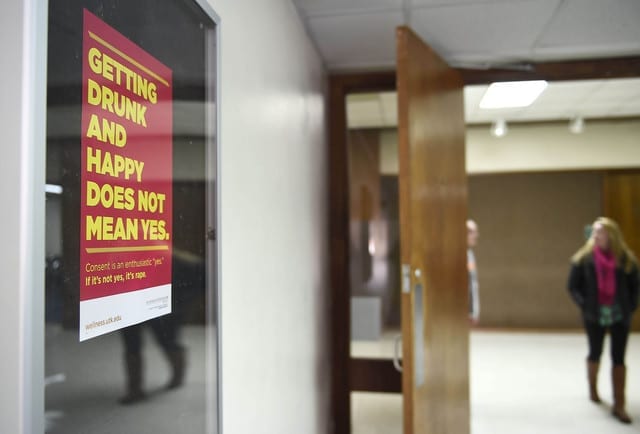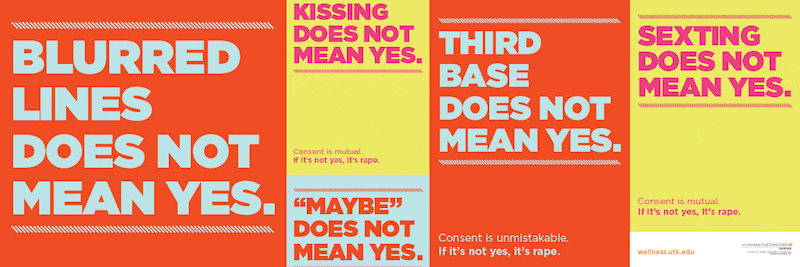Examining UTK’s sexual assault policy and how the definition of consent is being spread
With the new changes to the University of Tennessee’s sexual assault policy, Title IX coordinator Jenny Richter goes in-depth in what they are doing to promote the definition of consent.

A poster in a University Center study area stresses the definition of consent as part of a sexual assault awareness campaign by the University of Tennessee Center for Health Education & Wellness. (AMY SMOTHERMAN BURGESS/NEWS SENTINEL)
“… Does not mean yes” is a phrase that can be seen tapered all across the University of Tennessee’s campus, often following harmless acts such as “Netflix and chill,” or “Swiping right.”
This new campaign is just one of the many launched by the university to bring attention to what it actually means to receive full consent from a sexual partner.
According to a study performed by the Association of American Universities, 23.1 percent of women claimed to have been a victim of some form of sexual assault. These assaults can range from unwanted kissing, touching or rape, and it is indicative of an issue that has been growing across the United States.
To combat this, UTK’s Office of Equity and Diversity and Title IX program have come together in hopes of building a sexual assault policy that informs the student body, a policy that was recently updated at the beginning of the fall semester. This act comes on the heels of the university settling the Title IX lawsuit, a case that accused UTK of mishandling sexual assault cases, this past July.
One new change is that professors are no longer required to report a sexual assault if a student writes about it in an assignment. Instead, the faculty is supposed to inform the student of ways they can receive help.
Jenny Richter, Associate Vice Chancellor and Title IX coordinator, stated that the university wants people to get help, but did not want to force it.
“We didn’t want to force them into a corner so that they were making academic decisions about what they were and were not writing about,” Richter said.
There are also ways to find out about the rate of sexual assaults on campus, namely the annual reports that are sent out. Richter said that students who bring up an incident to an individual who is a mandatory reporter, qualifies as a report. Mandatory reporters include faculty, RA’s, advisors and emergency personnel.
A report does not mean that the entire legal process has played out, or that a full investigation has begun, it solely means that a student has made contact with a mandatory reporter and informed them of some form of sexual misconduct.
The aforementioned consent campaign displaying numerous phrases that do “not mean yes” is doing its best to bring about knowledge of a policy many students know little about.
The new campaign’s inception was based around one question, according to Richter; “How do you break down a sixty page policy so that it is digestible and helpful?”
It was also about spelling out this information in ways that simply sending out a student body-wide email wouldn’t. On Aug. 16, Richter and Title IX sent an email detailing the new changes to the sexual assault policy, and it’s one that numerous students completely overlooked.
Some students have been critical of the campaign, however. Junior Lorena Roberts said she had no idea she received an email and that she has some reservations when it comes to the “…does not mean yes” campaign.
“I think it does get a lot of attention, but it also makes it comical in a way that harms people’s perception of how serious it is,” Roberts said. “It’s like the emphasis isn’t on the right thing.”
Richter acknowledges there was an “information overload” in past programs, and overriding that is key to to informing more students. Even with the transition to web-based content, that issue has not been resolved.
“People don’t bother to look it up on the web because you’re pounded with information,” Roberts said.
To combat this, getting information out in a variety of ways is what Richter looks at as a solution so that “… when/if an event unfortunately occurs, somebody in the realm of that individual will know where to go for more information.”
But dispersing education about that information has long been an issue, with the most helpful way being unknown. As of right now, the university’s sexual assault website contains a wide array of information, but it’s unclear whether the 27,000+ students currently enrolled at UTK actually know the details of what is and is not clear consent.
Senior Seth Shepherd thinks the university does some effort to get the policy out there, but not quite enough. “I mean, they put the sexual assault at the end of the emails from UTPD about incidents of sexual assault, but it never feels like any attempt to inform students happens until after an incident,” he said.
Roberts thinks that we need to go beyond simple lectures during orientation and do something a bit larger.
“They should make all freshman take a sexual assault course. Not a simple online module, but an actual class,” he said.
Sexual assault cases have gained more and more attention all across the nation, with one of the most notable ones occurring at Duke University in 2006 when three members of the lacrosse team were accused of rape after a house party. The students were later found innocent after the North Carolina Attorney General dropped all charges.
Despite that, a great amount of attention was directed toward their policy and it has been consistently updated up to as recent as last year. These new changes made the policy apply to graduate and professional students as well as adding language for both heterosexual and same-sex encounters.
One of the more controversial sexual assault policies happened at Occidental College. In 2013, a group of students, faculty and alumni got together to file federal civil complaints against the university, stating that they had “deliberately discouraged victims from reporting sexual assaults,” as well as a host of other allegations.
The college responded by implementing a new policy that hired new Title IX coordinators, but most notably, opened a 24/7 hotline manned by students. On top of that, students could now report sexual assaults anonymously through an online form. This resulted in complications when two students were reportedly “tracked” after their reports, and were asked to meet with school officials.
Nonetheless, on the heels of increased attention towards the university’s sexual assault policy, the Office of Equity and Diversity has put a lot of effort forward in trying to assure a safe environment both on and off campus.
If you would like more information about the upcoming events relating to sexual assault awareness, check out the Center for Health Education and Wellness.
Images by Amy Smotherman Burgess/News Sentinel and Center for Health Education and Wellness
Edited by Kaitlin Flippo




